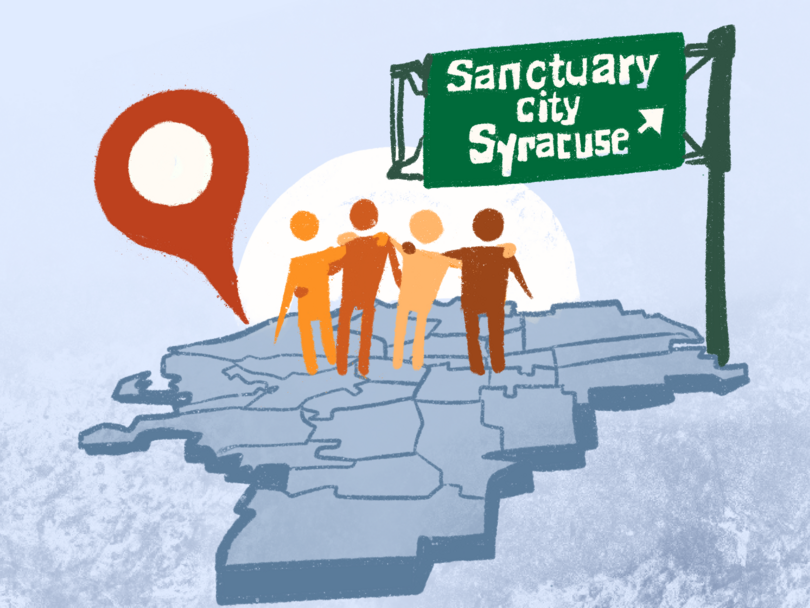Some officials avoid ‘sanctuary’ title, but embrace Syracuse’s immigrant roots

In 2017, former Mayor Stephanie Miner declared Syracuse a sanctuary city to protect its immigrant population. As President Donald Trump targets cities of similar status, Mayor Ben Walsh avoids the term, calling it “divisive.” Hannah Mesa | Illustration Editor
Get the latest Syracuse news delivered right to your inbox.
Subscribe to our newsletter here.
In 2017, former Syracuse Mayor Stephanie Miner declared Syracuse a sanctuary city. Current Mayor Ben Walsh avoids the term, calling it “divisive,” though both stressed the importance of protecting its immigrant communities.
In May, President Donald Trump’s administration included Syracuse on its targeted list of identified “sanctuary jurisdictions.” The report was quickly retracted, and an Aug. 5 list was released without the city included.
Sanctuary cities are cities, counties and states that refuse to enforce federal immigration policies on behalf of the federal government, said Jenny Breen, an associate professor at the Syracuse University College of Law.
Breen said these “sanctuary jurisdictions” are legal under the 10th Amendment, which recognizes states and cities as sovereign entities from the federal government. She said the government cannot “co-opt” cities into doing its work.
Walsh said the term sanctuary city “means different things to different people.” He said Miner’s decision to declare the city a sanctuary was “nothing more than a declaration.”
No policy or laws have changed since Walsh took office in 2018, he said, as the Syracuse Police Department does not enforce federal immigration law. However, Walsh said SPD does work with federal immigration authorities when investigating crimes.
“When federal officials want to work with us to deal with real crime and criminals. We welcome that,” Walsh said. “But much of what I’m seeing is not that and nothing that I want to be a part of.”
Trump’s attack on sanctuary cities is part of his larger crackdown on immigration, with an increase in United States Immigration and Customs Enforcement raids across the country.
On Sept. 12, ICE raided a protein bar factory in Cato, New York. Sixty-nine people were arrested. Some were deported to Guatemala and others are currently being held in Texas, syracuse.com reported.
Three days later, ICE detained Dragon China owner Li Xing Chen, who remains in custody. Chen is the third Chinese restaurateur arrested in the central New York area this summer, Central Current reported.
Walsh referred to these immigration enforcement efforts as “inhumane.” He said deporting “good, law-abiding citizens,” even ones without documentation, doesn’t make communities safer.
Breen, a former immigration lawyer, worked as a judicial law clerk on the U.S. Court of Appeals for the Second Circuit and is a member of the American Immigration Lawyers Association. She said sanctuary jurisdictions encourage integration with the immigrant community, making police interactions more cooperative.
“If people are worried that local law enforcement is going to be picking people up for immigration violations, people are probably going to be less willing to cooperate with law enforcement,” Breen said.
Many refugees who seek asylum in Syracuse come from countries where their government has “oppressed and terrorized” them, and witnessing similar actions from the U.S. government is troubling, Walsh said.
He emphasized that Syracuse is a welcoming and proud refugee resettlement city, saying, “people need to hear that now more than ever.”
Walsh said he “can’t fathom” what Syracuse would look like without its refugee community. He said the city’s population grew for the first time in 70 years in the 2020 census, likely driven in part by new immigrants.
Bob Searing, curator of history at the Onondaga Historical Association, said Syracuse has a “rich” history of immigration.
“Syracuse has a history of standing up for the moral imperative,” Searing said. “Depending on your politics, the moral imperative is looking out for families, whether they’re documented or not, and trying to do the humane thing, even if that is technically illegal under federal law.”
During the early 19th century, under the Fugitive Slave Act, cities like Syracuse, known as the “grand central depot” for the Underground Railroad, welcomed freedom seekers finding support and liberty, Searing said.
He cited the Jerry Rescue, where a crowd of Syracusans broke into jail to free William “Jerry” Henry in 1851, an enslaved man from Missouri who escaped to upstate New York and was captured and arrested.
“They ripped him out of jail, in defiance of federal law,” Searing said. “It had national ramifications in 1851, it was a major story and a major salvo in the fight against slavery.”
More than 170 years later, Searing said the event is an “incredible example” of Syracuse’s history of immigration.
Searing connected the fight against slavery to Trump’s deportation and immigration policies, saying they increase the federal government’s power to deport and question people “immorally.”
“Much like the ICE detentions we see all over the country today, the Fugitive Slave Act of 1850 gave increased power to slave catchers and to federal authorities to go into communities and deputize people for the kidnapping of purported fugitive slaves,” Searing said. “There was no trial by jury. So this is the corollary, and is almost one-to-one in my way of thinking.”
Breen said a Sept. 4 lawsuit in Boston filed by the U.S. Department of Justice states the city’s sanctuary city policies violate the Supremacy Clause. The DOJ claims local laws are preempted by the Constitution because the federal government has power over immigration law.
While the federal government can dictate immigration policy, Breen said she believes the Trump administration may be contradicting the 10th Amendment, which says the federal government may not commandeer the resources of a state government to enforce federal law.
ICE’s 287 (g) program gives states and local governments a choice to cooperate with the federal government. Although the program will fund the enforcement of federal immigration law, it is not required under the 10th Amendment’s protection.
“It’s going to be an uphill climb to claim that just sanctuary jurisdictions as a general rule violate the Supremacy Clause, because the 10th Amendment protects the right of states to be able to refuse to enforce federal law if they want,” Breen said.
Searing said all the “great progress made in this country” in terms of social change, including the end of slavery and the rise of women’s and LGBTQ+ rights, has been “spurred” by people operating outside the law.
“Sometimes there must be a higher law than the Constitution,” Searing said, quoting former U.S. Secretary of State William Henry Seward.
He believes that with the current discussion surrounding people in “illegal limbo,” Seward’s point is still relevant today.
“Their legality should not diminish their humanity,” Searing said.






